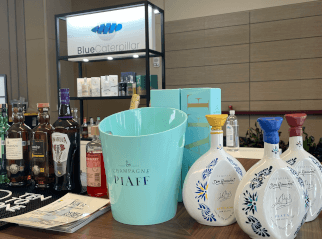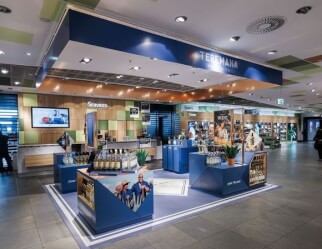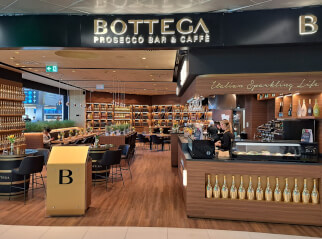ASUTIL’s Donagaray says we must keep walking
José Luis Donagaray, Secretary General of ASUTIL
During the ASUTIL conference held in Santiago, Chile in 2016, the guest keynote speaker was Roberto Canessa, who also participated in the ASUTIL webinar during 2020. In 1972 Canessa walked through the mountains for days to find help for the surviving victims of the famous Andes plane crash. While the current one is a very different type of crisis, José Luis Donagaray, Secretary General of ASUTIL, says the solution is the same: start to walk, as nobody will come for you.
Waiting for the vaccine
One of the difficulties facing Latin America travel and tourism — and therefore travel retail — is the lack of consistency on border restrictions from country to country. Uruguay has remained closed. Brazil has remained open. Most countries in the region fall somewhere in between, either requiring quarantine, negative PCR tests or both.
Donagaray says he does not think there will ever be a consistent entry standard as far as these means are concerned. He believes that, since the vaccination program has now begun for the region, there will be two conditions of entry for any country: Prove you have had a vaccination, or prove that you had the virus through an antigen test.
Donagaray expects that borders will begin to open for those who fall into those two categories within the next two or three months, and that things will remain as now until most of the population has been vaccinated. “This will be progressive,” he says. “First, start the vaccination process and then lift some borders. But this will be very dynamic.”
On the Brazil-Argentina border, changes are already brewing. Donagaray says it is expected that there will be news of Puerto Iguazu opening within the next week or so.
Changing the rules
Brazil’s border stores, which began to open in September, have done well considering the current situation. This is in great part because Brazilians are allowed to shop there.
Uruguayans cannot shop in their own stores, but although the border remains closed to Brazil, Brazilians are able to shop in Uruguay land border stores as immigration is on the other side. Be that as it may, ASUTIL has been hard at work lobbying the government to allow Uruguayans the right to purchase from their own duty free stores.
Currently, Uruguay has a trade agreement with the US that allows its residents to purchase US goods three times per year for an amount of U$S 200 each with no customs charges. ASUTIL is trying to make it possible to buy from the country’s own duty free stores instead. “We are working on this, but it’s not easy,” says Donagaray. “We have been working a lot with the governments. We cannot increase the number of passengers so we have to find a way to decrease costs or increase the average ticket,” he adds. ASUTIL is doing this by trying to get taxes lowered, by getting allowances increased, and any other ideas they can come up with.
As an example, he points out that passengers returning to Brazil from an international destination will fly to one of the larger airports but due to the size of the country must often get on another flight. This severely restricts their duty free purchasing as they take the items as carry-on for their next flight. ASUTIL is trying to get the government to allow a 15-day period to buy duty free after the flight, so travelers could shop online and the purchases could get delivered to their house. Donagaray says these talks are going well and the government is receptive. “We need to think a different way. A person cannot buy four bottles of liquor or a TV and get on another plane.”
Opening minds
While the association has had to work extra hard during this time — doing all the work it normally does plus a whole other set of jobs arising from the special circumstances, Donagaray says these special circumstances have also opened doors. Governments are listening. “In Latin America we are very accustomed to dealing with crisis, but usually we are the ones in crisis and the rest of the world is fine, so they help us,” he says. “This time the whole world it in crisis and there is no one to help, so we are all going to the government. The pandemic is very democratic.” This has created a situation where governments are more receptive to consider the industry’s plight and any possible solutions. The good news is, these solutions could well carry on after the pandemic is over.
Looking to future for tourism
Flights have returned to the region, but talk of tourism is a long way off. Domestic PAX for the region was down 43% and international was down 68% year on year, but there can be no real talk of tourism until most people have been vaccinated. The region lost its busy summer season and Brazil lost Carnival, so all eyes will be on the 2021/2022 season.
Some Caribbean countries and Cancun, however, did well, says Donagaray. “Those that kept their borders open had large numbers of US tourists.”
Big crisis = big work
The association is especially busy these days. They have been meeting with suppliers to see how they might help. ASUTIL is working with Peter Mohn on the Recovery Monitor, meeting with boards, with governments, and getting the Summit of the Americas ready. And if that all isn’t enough, they are also working on getting the borders meeting ready for end of this year, which Donagaray hopes will be held in person in November. “For the association, it’s big work during a big crisis,” he says.
ASUTIL membership remains high, with many retailers and brands taking part. This membership is imperative when Donagaray speaks with governments, as he is able to tell them all the companies the association represents, giving his words more weight. “We did a lot of things with ALTA (Latin American and Caribbean Air Transport Association), with ACI Latin America; we helped airports to negotiate fees, we negotiated fees at the border, we’ve had lots of success,” he says. “The biggest success is to open the minds of authorities so they understand what is happening.”
ASUTIL is also preparing a webinars that will take place later this month as in 2020.
Summit of the Americas
The Summit of the Americas has “three legs,” according to Donagaray. First is the speakers, or the knowledge hub. Donagaray is quite excited about the quality and variety of keynote speakers.
Then are the retailers, and while the digital event may not allow for social events such as the opening cocktail or meeting colleagues for lunch or dinner, it does allow for people to take part who normally wouldn’t. Donagaray says there are 150 people from retailers all around LATAM, and this gives the opportunity for brands to speak with people they wouldn’t usually get the chance to, such as marketing personnel.
And then there are the stands. Currently the number of stands sold is not yet as expected, they are working on this. “We need to do things; we need to share information; we need to connect suppliers and operators; need to connect people you don’t normally see at conference. We are confident this will go well.”
While there’s no denying certain aspects of the conference cannot be replaced digitally — everyone staying in one hotel, seeing each other throughout the day and at social events, doing day trips together — Donagaray has high hopes this will return next year.










